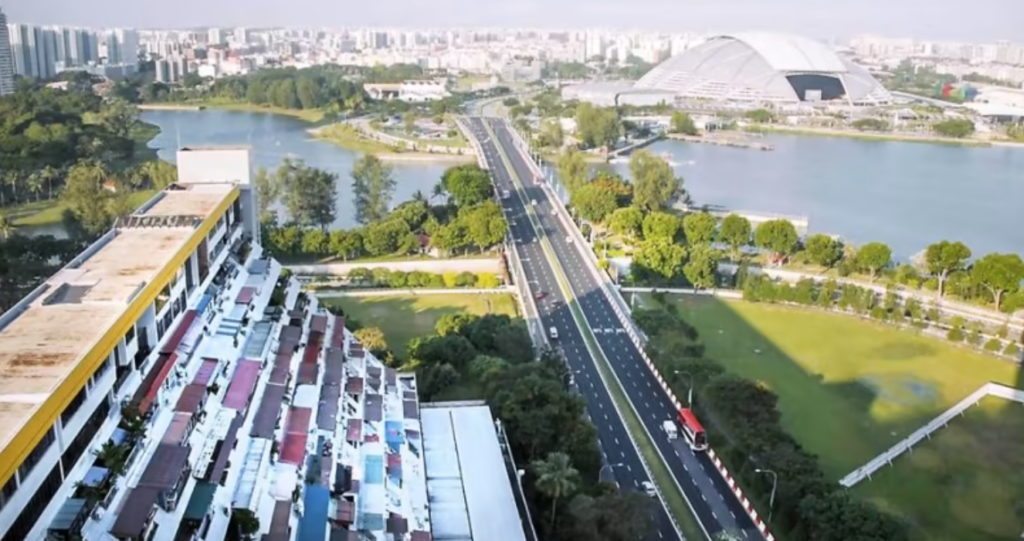Golden Mile Complex, an architectural icon in Singapore known for its distinctive brutalist style, has been making headlines with its collective sale, a move that marks a significant chapter in the city-state’s urban redevelopment narrative. The collective sale of Golden Mile Complex is not just about the transaction of a property; it’s a story of heritage, modernization, and the future of urban living in Singapore.
The Background of Golden Mile Complex
Built in the early 1970s, Golden Mile Complex is a testament to Singapore’s bold architectural experimentation during that period. Its unique stepped-terrace structure, resembling an ancient ziggurat, has been a standout feature in the city’s skyline. Over the years, the complex became a hub for the Thai community in Singapore, earning the nickname “Little Thailand” due to its concentration of Thai shops, eateries, and cultural spaces.
The Collective Sale Process
The collective sale process for Golden Mile Complex has been a subject of great interest and scrutiny. This process involves the sale of the entire building and the subsequent distribution of the sale proceeds among the individual unit owners. Given the building’s age and maintenance requirements, the collective sale was seen by many as a necessary step towards revitalization.
The Significance of the Sale
The sale of Golden Mile Complex holds significant importance for several reasons. Firstly, it’s one of the largest and most notable collective sales in Singapore’s history, given the building’s size and iconic status. Secondly, it represents a critical juncture between preserving a piece of Singapore’s architectural heritage and making way for modern development.
Challenges and Controversies
The collective sale has not been without challenges and controversies. One of the main issues has been the balancing act between heritage preservation and redevelopment. Conservationists have raised concerns about maintaining the architectural integrity of Golden Mile Complex, given its historical and cultural significance. Additionally, there have been discussions around the financial implications for the existing owners and the impact on the businesses operating within the complex.
The Redevelopment Plan
The redevelopment plan for Golden Mile Complex aims to transform the site while retaining its iconic façade. The vision is to create a mixed-use development, incorporating residential, commercial, and possibly office spaces. This redevelopment is expected to breathe new life into the building, making it more relevant and functional in the contemporary urban landscape of Singapore.
The Impact on “Little Thailand”
The transformation of Golden Mile Complex will have a significant impact on the “Little Thailand” community. While there is a commitment to preserve some aspects of the Thai cultural presence, the redevelopment will inevitably bring changes. The challenge lies in maintaining the cultural essence of the area while accommodating new developments.
Potential Benefits of the Sale
The collective sale of Golden Mile Complex presents several potential benefits. For the property owners, it provides an opportunity to realize the value of their investments. For the city, it’s a chance to rejuvenate a key area with modern infrastructure and amenities. Economically, the redevelopment is expected to attract new businesses and residents, boosting the local economy.
Addressing Heritage Preservation
One of the key aspects of the redevelopment is addressing heritage preservation. The plan to retain the building’s iconic façade is a nod to its architectural significance. This approach is seen as a compromise between development needs and heritage conservation, serving as a potential model for other similar projects in the future.
The Future of Urban Development
The collective sale and subsequent redevelopment of Golden Mile Complex are reflective of a broader trend in urban development in Singapore. It highlights the challenges cities face in balancing development with heritage preservation, especially in rapidly modernizing urban landscapes.
Legal and Regulatory Aspects
The collective sale of a property like Golden Mile Complex is governed by a complex set of legal and regulatory frameworks. These regulations ensure that the sale process is fair and transparent, protecting the interests of all parties involved. Navigating these legalities has been an integral part of the collective sale process.
Community Responses
The response from the community has been mixed. While some see the collective sale as a positive step towards modernization, others feel a sense of loss over the potential changes to a familiar landmark and community hub. Engaging with these community sentiments has been an important aspect of the collective sale process.
